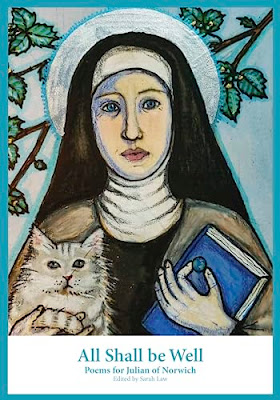Love is the Meaning is an international art exhibition in response to Julian of Norwich’s ‘shewings’ 650 years ago which is in Julian’s city from 18th October – 16th November.
Julian of Norwich's writing continues to surprise, baffle and delight. She thought it was worthwhile to ask God how He could possibly claim that ‘All shall be Well’ and the end response was ‘Love is the Meaning’.
Over forty artists from several different countries have responded, and the results are on show in three venues. The artists have used media from the traditional crafts of stained glass, stone carving, and weaving to conceptual art in sound and light. There is a podcast and interactive installations to spark the imagination and light up Julian’s words.
Often it takes years of living with a picture – a good picture – to see it all. And often we can’t put the reason it is so satisfying into words. Julian studied the pictures sent to her by God for over twenty years – because she wanted to understand them and she believed their meaning was important. It was a most dangerous act of faith in those years when it became illegal to read or write about God in English. For lay people like Julian, teaching theology – in English – was punishable by a most hideous death of burning at the stake in nearby Lollard’s Pit. In spite of the danger, Julian wrote the first book in English by a woman.
St Julian's, St John's Timberhill, and St Stephen's Rampant Horse Street in Norwich are all connected with Julian's life. The exhibition takes the form of an exciting pilgrimage walk and exploration of the art and history of these important churches. Special guided walks with Paul Dickson on some dates introduce visitors to Medieval Norwich to help visitors explore the medieval city that Julian would have known so well.
“Julian counselled people daily throughout her years as an anchoress, and we want to reawaken the conversation.” says Lucy Care, curator of the exhibition. “This exhibition exploring her pictures through the eyes of modern artists allows us to see her work with fresh eyes. Prepare to wonder, be confused, indignant or refilled with happiness as her conviction that Love is the meaning of God’s creation is made visible. That love resides in every being, every drop of water and every organic cell of the universe, just as the artist’s DNA can be found in every fibre of their own work.”
The exhibition is over three venues, St Julian’s in Julian Alley, St John the Baptist, Timberhill and St Stephen’s, Rampant Horse Street. The exhibition is planned to give a sense of pilgrimage as visitors walk the streets of medieval Norwich. All venues are open 10am – 3pm, seven days a week. Church services will also be happening from time to time.
For information on workshops and times of church services please look on the website: https://julianofnorwich.org/pages/love-is-the-meaning-an-exhibition-of-new-art-celebrating-the-words-and-shewings-of-julian-of-norwich#.
'All Shall Be Well' is an anthology of new poems for Mother Julian, medieval mystic, anchoress, and the first woman to write a book in English. Lyrical, prayerful, vivid and insightful, these poems offer a poetic testament to Julian's enduring legacy of prayer and confidence in a merciful God who assured her that 'All Shall Be Well, and All Shall Be Well, and All Manner of Thing Shall Be Well.' The anthology has been edited by and comes with an introduction by Sarah Law, editor of Amethyst Review. Copies can be purchased here: Amazon US; Amazon UK; Amazon AU (plus other Amazon platforms).




















